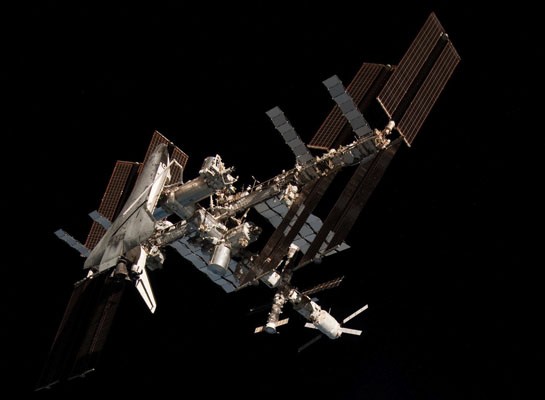BCC Selects Project for Prestigious Space Flight Experiment
Student researchers' cell division experiment will travel to space for tests conducted by astronauts
Pittsfield, MA — Berkshire Community College (BCC), which was selected last year to participate in the Student Spaceflight Experiments Program (SSEP)'s Mission 18, has announced its project to be sent to the International Space Station (ISS) as part of a microgravity research experiment.

Entitled "The Effects of Microgravity on the Chromosomal Alignment on the Metaphase Plate in Onion Root Tip Cells," the project was researched and devised by BCC students William Garrity, Erica Langnickel and Anastasiya Bolotova. The experiment focuses on the metaphase portion of cell division.
When a cell divides, it goes through several different stages to turn one set of DNA chromosomes into two. All the genetic information of the cell is contained in these chromosomes. If the copying process doesn't complete accurately, one or both sets of chromosomes could contain errors, i.e., "mutations," explained Colin Wilson, director of Berkshire Science Commons at BCC.
"During the metaphase stage, the chromosomes are aligned down the center of the cell so that they can be split and copied. However, in microgravity, some of the mechanisms for that alignment could be thrown off or even not work altogether, as the cell has no sense of 'down' with which to orient itself," Wilson said. "While astronauts do not generally come back with serious mutations, even small disturbances could add up over time. As humanity prepares to spend more and more time in space, this is an important question to ask."
The BCC student project will conduct a cell division experiment with onion root tips, which grow rapidly with many cell divisions per minute, and a fixative agent will be added to halt division simultaneously. One version of the experiment will happen on the International Space Station, while a control experiment will be conducted at BCC in full gravity. When the microgravity sample is returned, the halted root tips will be examined side-by-side under a light microscope to see if there were any changes or drifts in alignment for those cells whose division was halted.
When I found out our group had been selected by SSEP to have our experiment conducted on the ISS, I was elated. I have been interested in astronomy and related space sciences since middle school, and having the opportunity to conduct real microgravity research as early as the associate degree level has been a dream come true. I'm excited to see the results of our experiment, no matter what they are, and I know BCC is just as excited and eager to help us.
Fellow student researcher William Garrity said, "It is very exciting that our project got selected to go up to the International Space Station. I would have never thought that I would have the opportunity to develop a research project that would be sent to space here at BCC." Garrity noted that the student research group is currently reviewing SSEP's recommendations to improve their experiment.
"I've always wanted to touch space. I never thought I could so soon, even if it's indirectly," said student researcher Anastasiya Bolotova. "To say that this is a dream come true would not do it justice. I am so grateful for the opportunities given to us by everyone involved from BCC and SSEP, and I give heartfelt thanks to everyone who is supporting us or just watching our journey."
Experiments will be sent to the ISS via private launch company SpaceX's Dragon 2 spacecraft, atop a Falcon 9 rocket, during a cargo supply mission. When the automated rocket reaches the ISS, astronauts will unload a payload box containing student microgravity experiments. The astronauts will follow instructions on how to operate each of these experiments and then send the experiments back down to Earth, where students will compare the results to the control version operated in full gravity.
The research students involved in the project will present the details of the experiment at BCC's Undergraduate Scholars Conference on February 8. Those interested in learning more about the project are welcome to attend the conference.
"Being able to work with William, Anastasiya and Erica on this project has been the highlight of my first semester as a full-time professor at BCC," said Assistant Professor of Biology Dylan Carman, teacher facilitator for the project. "They've worked really hard to make it to this point, and I'm incredibly proud of the work they've done, what they've already achieved, and what they'll do with this project in the future. One of my goals is to inspire the next generation of students to realize how exciting research can be, and BCC's participation in this program has allowed me to do just that."
The SpaceX Falcon 9 rocket will launch from NASA's Kennedy Space Center in Cape Canaveral, Florida. SSEP students and their families, teachers and community stakeholders will be given the opportunity to attend the launch in person. The launch date will be announced in the coming few months.
The SSEP Mission 18 program is supported through a grant from the Massachusetts Space Grant Consortium (MASGC) and the BCC Foundation, a non-profit corporation established to encourage and receive gifts in support of the mission of the College. The Foundation has pledged $19,000 to help fund the project.
